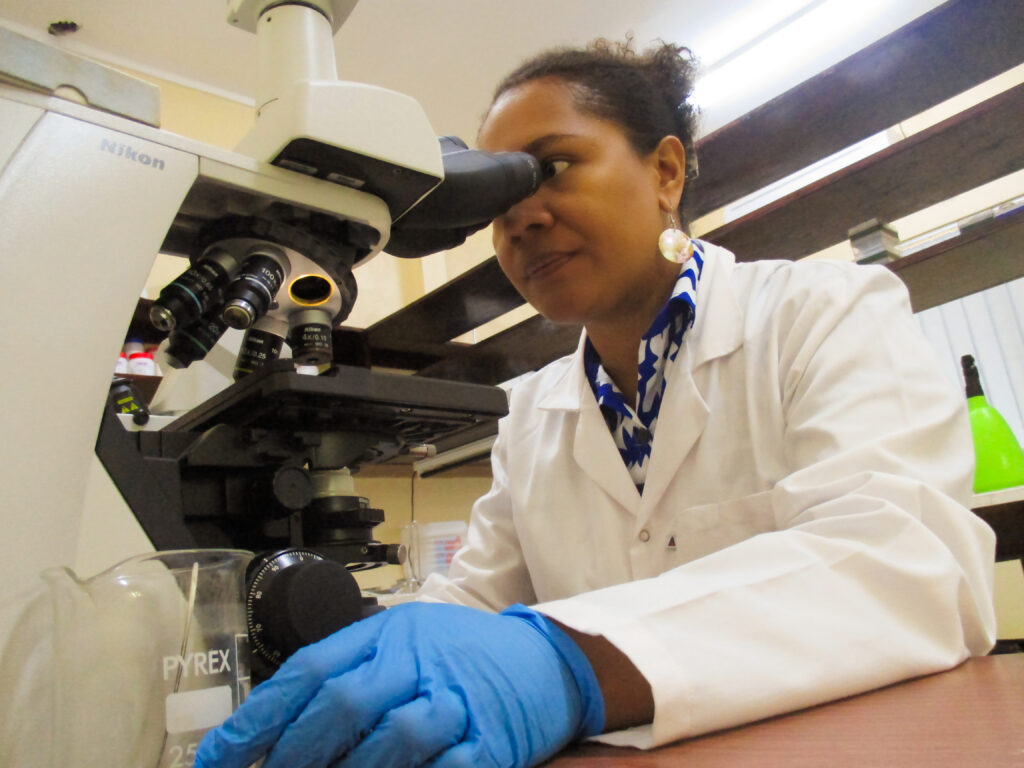Farming the future: Ane Mataitoga’s mission to protect crops and break barriers

“Follow your passion!”
These are the words of Ane Mataitoga, a dedicated research officer with the Plant Health Project, under the Ministry of Agriculture.
Through the Pacific Horticultural and Agricultural Market Access Plus (PHAMA Plus) Program, Australia and New Zealand support the Plant Health Project, an initiative focused on raising awareness about kava dieback disease. The project educates kava farmers to recognise the disease’s symptoms and to implement effective management practices, ensuring the sustainability of the kava industry.
Ane’s passion for pathology started in university when she had to choose between a medical career or plant pathology in her final year.
“I was fascinated with pathology, but most importantly, I saw how my work contributed to farmers. We need food, farmers plant food, what if something happens to the food? What does that mean for the rest of us? Since then, I was determined to follow the path of pathology, regardless of it being a male-dominated space.”
Ane acknowledges the challenges of working in a male-dominated profession but emphasises the importance of resilience.
“There have been instances where we get remarks when we’re out in the field, like… ‘There aren’t any toilets here in the bush,’ and so on. These backhanded comments don’t discourage me. I was 5 months pregnant when I had to cross rivers, climb hills, and trek through bush to reach kava farms. We (women) should learn to adapt. I’ve been in situations where we’re conducting awareness sessions in villages, and farmers come up to me saying things like, ‘What do you know about farming? You’re a woman!’ or ‘How old are you? Do you even know what you’re talking about?’ You need the confidence to own your space. You are here to do your job, not to worry about how people see you.”
Ane believes that understanding one’s identity and culture helps break down barriers, especially in traditional and male-dominated spaces.
“I am from Lau, and my mother is from Kadavu. Sometimes, knowing where you’re from helps connect with people. Here in Fiji, we are all connected through the land. A village by the sea can have ties to villages in the mountains, and these connections create acceptance.
There have been times when people were hesitant to speak to me because I am a woman or because of my age. But once they find out where I’m from, their entire demeanour changes. They greet me warmly and say things like, ‘My mother is from your father’s village,’ or ‘My son or daughter is married to someone from your dad’s village.’ Knowing my identity helps break down these barriers.”
Ane shares that women in male-dominated fields often need to go beyond the call of duty to prove they belong.
“Sometimes, as a woman in this space, you need to step out of your comfort zone and make small compromises to do your job. A part of my job is to raise awareness among farmers. They are so important to our economy and our households; without them, how would we get our crops and vegetables? To get farmers to listen, we must adapt. I hardly drink kava but in a traditional setting, kava sessions are where people feel comfortable talking. So, to build trust, I need to have a few bowls!”
Ane expresses her gratitude to PHAMA Plus for their support, recognising the vital role farmers play in food security.
“Our farmers are on the frontline. The work we do is critical for food supply, and PHAMA Plus’s support allows us to carry out awareness sessions in communities, helping our farmers become better prepared.”
Through her determination, resilience, and deep connection to her work, Ane Mataitoga is not just a plant pathologist; she is a trailblazer for women in agriculture and science, breaking barriers and ensuring a brighter future for farmers in the Pacific.
